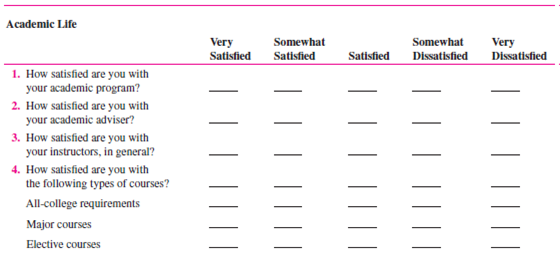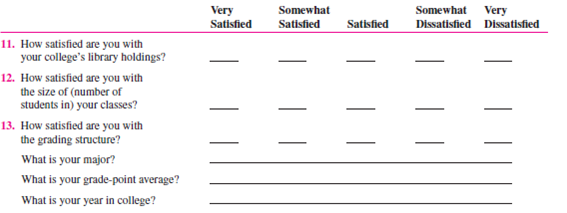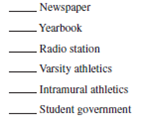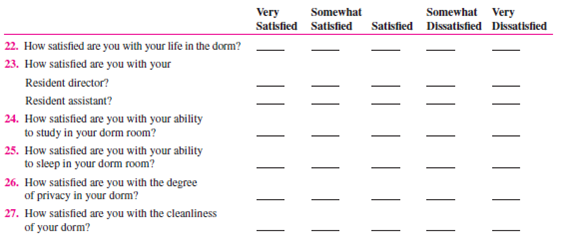
Human Relations in Organizations: Applications and Skill Building 8th Edition by Robert Lussier
Edition 8ISBN: 978-0073602370
Human Relations in Organizations: Applications and Skill Building 8th Edition by Robert Lussier
Edition 8ISBN: 978-0073602370 Exercise 51
A popular method of determining organizational climate is a survey questionnaire. Below is a survey instrument developed by Dr. Roland E. Holstead, former chairperson of the Department of Social Sciences and Human Services at Springfield College, and adapted with his permission. Answer the questions as they apply to your college. Leave unanswered the questions that do not apply to you or your school. 
5. In your experience, what academic departments offer some of the most worthwhile courses?
__________________________________________________
__________________________________________________
__________________________________________________
6. In your experience, what academic departments offer some of the least worthwhile courses?
__________________________________________________
__________________________________________________
__________________________________________________
7. A. How difficult are the following types of courses for you personally?
B. How challenging are the following types of courses for you personally?
C. How interesting are the following types of courses for you personally?
D. For Juniors and Seniors Only: Some courses are numbered for freshmen-sophomores, others for juniorsseniors, and others for seniors-graduate students. Would you agree that as the course number increases, the difficulty or demand on your performance also increases? In other words, are junior-senior courses generally harder than freshman-sophomore courses?
8. A. Where do you study most often?
B. How satisfied are you with your ability to study in each of the following places?
9. About how many hours a day, if any, do you spend at each activity? Completing assignments Reading Studying
10. About how many classes do you cut per week, if any?
Student Services
14. Which of the following services have you ever used, and how satisfied were you with them?

Social Life
15. In general, are you satisfied with the social life at your college?_________
16. Are there enough social activities planned on campus during a typical week? __________ If not, what activities should be increased?
__________________________________________________
__________________________________________________
__________________________________________________
17. In which of the following social activities do you engage on a weekly basis, when available?
18. On what night(s) would you be most likely to attend a social/cultural event on the campus?
19. A. How often do you go home (if you are living away from home to go to college)?
B. For what reason(s) are you most likely to go home during a school term other than a holiday or term break?
__________________________________________________
__________________________________________________
__________________________________________________
20. What types of events would you like to see available on campus?
__________________________________________________
__________________________________________________
__________________________________________________
21. In which of the following activities do you participate?

Dorm Life (Skip questions 22-33 if you do not live in a dorm.)


B. Are there problems in your dorm not identified above? If yes, what are they?
__________________________________________________
__________________________________________________
__________________________________________________
C. To whom did you report any of these problems?
Were you satisfied with the official response to the problem?
32. What are the best things about your dorm?
__________________________________________________
__________________________________________________
__________________________________________________
33. If you could change anything about your dorm, what would it be, and why?
__________________________________________________
__________________________________________________
__________________________________________________
In what dorm do you live? ________________________
Do most of your college friends live in your dorm? _________
Objectives: To better understand organizational climate and the climate at your college.
AACSB: The AACSB learning standard skills developed through this exercise are analytic skills, communication ability, and leadership.
Preparation: You should have completed the preparation questionnaire.
Experience: Your class will calculate its climate and discuss it.
Tabulate the Class's Survey Responses
Option A: Break up into teams of five or six and tabulate team members' responses to each of the questions selected by your instructor. Each group reports its responses to the instructor, who tabulates the total responses for the entire class. He or she summarizes the results on the board.
Option B: The instructor asks students to indicate their responses to selected questions by raising their hands. The instructor totals the responses to each question and writes them on the board.
Discuss School Climate
1. Climate surveys are usually given to an entire organization or to a major unit. Can you assume that your class is representative of the entire college or university? Why or why not?
2. The survey questions were designed for Springfield College. What sections or individual questions should be changed or added to make the survey more reflective of the climate at your school?
3. Is your school's climate consistent with your needs (and with the needs of the student body as a whole)?
4. How does your school's climate affect your behavior and attitudes (and those of the student body)?
5. How does your school's climate affect your (and the student body's) performance and productivity?
6. Would conducting a climate survey of the entire student body be of value at your college or university? Why or why not?
Conclusion: The instructor leads a class discussion and/or makes concluding remarks.
Application (2-4 minutes): What did I learn from this experience? How will I use this knowledge in the future?
Sharing: Volunteers give their answers to the application section.

5. In your experience, what academic departments offer some of the most worthwhile courses?
__________________________________________________
__________________________________________________
__________________________________________________
6. In your experience, what academic departments offer some of the least worthwhile courses?
__________________________________________________
__________________________________________________
__________________________________________________
7. A. How difficult are the following types of courses for you personally?

B. How challenging are the following types of courses for you personally?

C. How interesting are the following types of courses for you personally?

D. For Juniors and Seniors Only: Some courses are numbered for freshmen-sophomores, others for juniorsseniors, and others for seniors-graduate students. Would you agree that as the course number increases, the difficulty or demand on your performance also increases? In other words, are junior-senior courses generally harder than freshman-sophomore courses?

8. A. Where do you study most often?

B. How satisfied are you with your ability to study in each of the following places?

9. About how many hours a day, if any, do you spend at each activity? Completing assignments Reading Studying
10. About how many classes do you cut per week, if any?

Student Services
14. Which of the following services have you ever used, and how satisfied were you with them?


Social Life
15. In general, are you satisfied with the social life at your college?_________
16. Are there enough social activities planned on campus during a typical week? __________ If not, what activities should be increased?
__________________________________________________
__________________________________________________
__________________________________________________
17. In which of the following social activities do you engage on a weekly basis, when available?

18. On what night(s) would you be most likely to attend a social/cultural event on the campus?
19. A. How often do you go home (if you are living away from home to go to college)?

B. For what reason(s) are you most likely to go home during a school term other than a holiday or term break?
__________________________________________________
__________________________________________________
__________________________________________________
20. What types of events would you like to see available on campus?
__________________________________________________
__________________________________________________
__________________________________________________
21. In which of the following activities do you participate?


Dorm Life (Skip questions 22-33 if you do not live in a dorm.)



B. Are there problems in your dorm not identified above? If yes, what are they?
__________________________________________________
__________________________________________________
__________________________________________________
C. To whom did you report any of these problems?

Were you satisfied with the official response to the problem?
32. What are the best things about your dorm?
__________________________________________________
__________________________________________________
__________________________________________________
33. If you could change anything about your dorm, what would it be, and why?
__________________________________________________
__________________________________________________
__________________________________________________
In what dorm do you live? ________________________
Do most of your college friends live in your dorm? _________
Objectives: To better understand organizational climate and the climate at your college.
AACSB: The AACSB learning standard skills developed through this exercise are analytic skills, communication ability, and leadership.
Preparation: You should have completed the preparation questionnaire.
Experience: Your class will calculate its climate and discuss it.
Tabulate the Class's Survey Responses
Option A: Break up into teams of five or six and tabulate team members' responses to each of the questions selected by your instructor. Each group reports its responses to the instructor, who tabulates the total responses for the entire class. He or she summarizes the results on the board.
Option B: The instructor asks students to indicate their responses to selected questions by raising their hands. The instructor totals the responses to each question and writes them on the board.
Discuss School Climate
1. Climate surveys are usually given to an entire organization or to a major unit. Can you assume that your class is representative of the entire college or university? Why or why not?
2. The survey questions were designed for Springfield College. What sections or individual questions should be changed or added to make the survey more reflective of the climate at your school?
3. Is your school's climate consistent with your needs (and with the needs of the student body as a whole)?
4. How does your school's climate affect your behavior and attitudes (and those of the student body)?
5. How does your school's climate affect your (and the student body's) performance and productivity?
6. Would conducting a climate survey of the entire student body be of value at your college or university? Why or why not?
Conclusion: The instructor leads a class discussion and/or makes concluding remarks.
Application (2-4 minutes): What did I learn from this experience? How will I use this knowledge in the future?
Sharing: Volunteers give their answers to the application section.
Explanation

This question doesn’t have an expert verified answer yet, let Examlex AI Copilot help.
Human Relations in Organizations: Applications and Skill Building 8th Edition by Robert Lussier
Why don’t you like this exercise?
Other Minimum 8 character and maximum 255 character
Character 255


